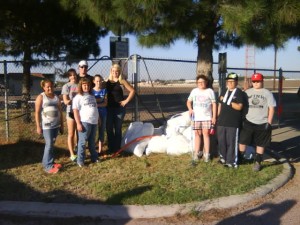- 4-H Online Enrollment
- Aggie Horticulture
- Garden Information
- Poison Plants
- Weather
- USDA
- Maps
- Texas Natural Resources
- Texas Department of Agriculture
- Publications from Extension
Welcome to the Winkler/Loving County Extension Office
Winkler County is an 840 square mile county in the Trans-Pecos Desert Area of West Texas bordering New Mexico. The annual rainfall is an average of 11.33 inches. However, the county has been in extreme drought situation for the past seven years having a devastating effect on the livestock industry. Winkler County has a population of 8355 people with a per capita personal income of $14,645 which ranked 211th in the state and was 74.3% of the state average and 67.5% of the national average. Winkler County has primarily an oil and gas economy with a 2000 certified oil and gas certified mineral tax base of $563,647,350 with a total tax base of $630,658,291. 89% of the tax base is minerals. Agriculture is growing in all aspects in the county.
Historically, Winkler County was an Apache area until the arrival of the Comanches in the 1700s. Anglos began ranching operations in the 1800s and oil was discovered in 1926. Mexican migration increased after 1960. The county was named for Col. C.M. Winkler and was created from Tom Green County in 1887. Winkler County was organized in 1910. Kermit, the county seat, was named after Teddy Roosevelt?s son Kermit Roosevelt.
Over $3,441,000.00 a year in income comes from agriculture, the vast majority of which comes from beef cattle cow-calf operations ($3,177,000.00). The operations are extremely large and have, in the past, depended in varying degrees on oilfield damage payments for funds used for improvements, conservation, and brush control practices. Most of these operations have become much more efficient caused, in part, by decreases in oilfield related income. With an average 10 animal unit per section stocking rate, most pastures are extremely large by most standards. Winkler County is the home of several nationally recognized breeders of Registered Hereford Cattle. The small farm production of meat goats is growing extremely rapidly with an income of over $75,000 in 2000. Winkler County is becoming noted for the production of some of the finest quality Boer Goat Breeding Stock in the country. Over $48,000. worth of Quarter Horses were produced in the county last year.
Irrigated farming is on the increase due to the availability of underground water from the Santa Rosa and Cenozoic Alluvial aquifers. One large irrigated potato operation produced over 10 million pounds of chip potatoes. A new venture started this year, is producing seedless watermelons.
Home horticulture is an area of interest to a large number of Winkler County residents aided extensively by the Extension Master Gardener Program. This is, in part, due to the surrounding desert conditions and the fact that, with enough water, almost anything can be grown in the sandy soils and the long growing season (219 days) of this area.
Loving County the smallest county in the Permian Basin of West Texas, is bounded on the east by Winkler County, on the south by Ward County, on the west by the Pecos River and Reeves County, and on the north by Eddy and Lea counties, New Mexico. The center of the county lies at 31’50’ north latitude and 103’35’ west longitude. Mentone, the county seat and only town in the county, is located in its southwestern corner seventy-five miles west of Odessa. Loving County consists of 671 square miles of flat desert terrain with a few low-rolling hills stretching over calichified bedrock and wash deposits of pebbles, gravel, and sand. The soils of the county-loams, chalk, clays, and sands-support desert shrubs, cacti, range grasses, and salt cedars along the river. Wildlife includes waterfowl, quail, deer, badgers, javelinas, rabbits, bobcats, coyotes, armadillos, skunks, opossums, raccoons, rattlesnakes, killifish, brine shrimp, and turtles. Elevations vary from 2,686 to 3,311 feet above sea level. Temperatures vary from an average low of 29 F in January to an average high of 96F in July. The growing season lasts 222 days. Rainfall averages just over ten inches. The county has an immature drainage system made up of hundreds of playas and dry draws that feed into the Pecos only after heavy rainfall. In 1936 Red Bluff Dam was built across the Pecos on the Texas-New Mexico boundary for irrigation and recreation. Water from the Pecos, however, is too saline for drinking, so the 100 residents of the county haul water from a community tank.
Winkler and Loving county is home to the 4-H Youth Development programs in Kermit, Wink and Mentone Texas. Through the support of the Winkler and Loving County Commissioners Court and a strong core of supporters over $104,000.00 was generated by the 4-H youth agriculture program last year to support the youth project program. Livestock project programs and livestock judging are the largest projects. Master volunteers assist in traditional and school enrichment projects for the 4-H youth. Life Skills projects done cooperatively with the Kermit/Wink/Loving Special Education Cooperative have won state and national honors. The Winkler County Junior Leadership Project of extensive leadership training for high school juniors is supported by businesses and organizations across the county.

